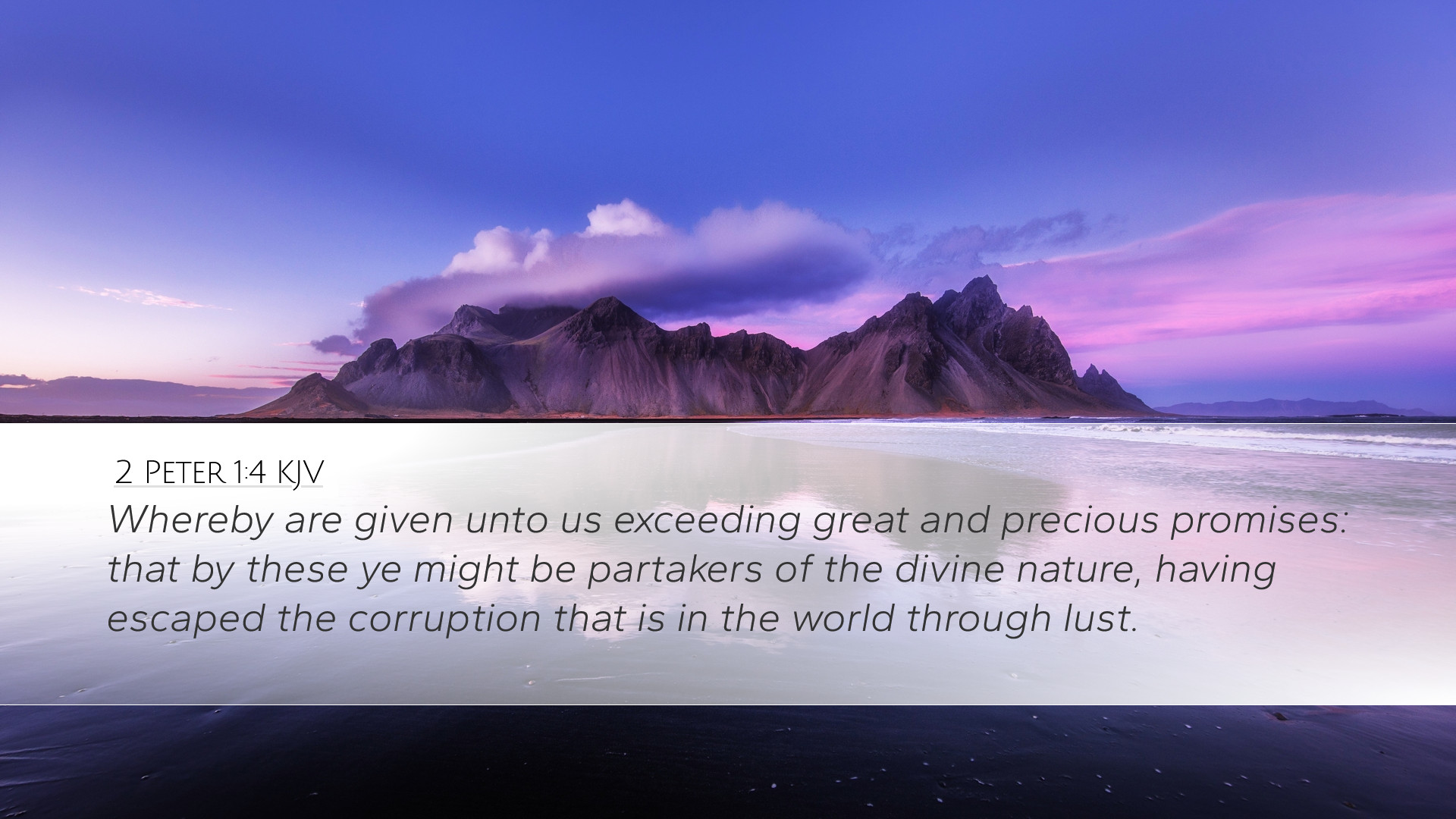Old Testament
Genesis Exodus Leviticus Numbers Deuteronomy Joshua Judges Ruth 1 Samuel 2 Samuel 1 Kings 2 Kings 1 Chronicles 2 Chronicles Ezra Nehemiah Esther Job Psalms Proverbs Ecclesiastes Song of Solomon Isaiah Jeremiah Lamentations Ezekiel Daniel Hosea Joel Amos Obadiah Jonah Micah Nahum Habakkuk Zephaniah Haggai Zechariah Malachi2 Peter 1:4
2 Peter 1:4 KJV
Whereby are given unto us exceeding great and precious promises: that by these ye might be partakers of the divine nature, having escaped the corruption that is in the world through lust.
2 Peter 1:4 Bible Commentary
Commentary on 2 Peter 1:4
Verse Analysis: "Whereby are given unto us exceeding great and precious promises: that by these ye might be partakers of the divine nature, having escaped the corruption that is in the world through lust."
Introduction
This verse from 2 Peter encapsulates the essence of the Christian faith: the promises of God and the transformational power of being a partaker of the divine nature. It emphasizes the believer’s union with Christ and the resultant change in their spiritual state.
Exceeding Great and Precious Promises
Peter begins with highlighting the nature of God’s promises. Matthew Henry suggests that these promises are "exceeding great" referring not only to their magnitude but to their importance for believers. They are promises filled with hope and assurance, providing the foundation for a believer’s faith.
Albert Barnes interprets this to mean that the promises are precious because they are made by a faithful God. These promises invite believers to trust in their validity as they pertain to salvation, divine assistance, and eternal life. The dual emphasis on 'great' and 'precious' serves to remind us that God’s promises surpass human understanding and must be valued accordingly.
Partakers of the Divine Nature
Peter presents believers as partakers of the divine nature, which Adam Clarke notes signifies that through the Holy Spirit, individuals are united with Christ. This union transforms believers, infusing them with the essence of divine grace.
This divine nature is not about attaining divinity but rather participating in God's moral and spiritual qualities. As believers, we reflect Christ’s characteristics in our lives, which includes love, holiness, and righteousness. Clarke emphasizes that through these promises, we are empowered to live victorious lives that reflect divine attributes.
Escaping Corruption
The latter part of the verse addresses the escape from the "corruption that is in the world through lust." Here, Henry highlights the moral condition of the world, which stands in stark contrast to the divine nature imparted to believers. This corruption results from human desire that is often misaligned with God’s will.
Barnes comments on the dangers of lust and corruption, noting that while the world offers temporary gratification, it ultimately leads to spiritual death. The promises of God provide a means of escape from these destructive patterns. The act of believing in God’s word and resting on His promises is essential for overcoming worldly temptations.
The Implications for Believers
This verse presents several implications for believers:
- Assurance in the Promise: Understanding that God's promises are "exceeding great" provides believers with a sense of security and hope amidst life's uncertainties.
- Active Participation: Partaking in the divine nature calls for active participation in the life of faith, leading to spiritual growth and maturity.
- Moral Responsibility: With the promises comes the responsibility to escape the corruption of the world, emphasizing the need for a lifestyle characterized by holiness and obedience to God.
Theological Reflection
From a theological standpoint, this verse contributes significantly to the understanding of soteriology (the study of salvation) and sanctification. It reveals the interplay between divine grace and human responsibility.
The doctrine of participation in the divine nature affirms the transformative aspect of salvation. It does not suggest an eradication of human nature but rather a profound change that aligns the believer’s will with God’s will.
Conclusion
2 Peter 1:4 serves as a powerful reminder of the gracious nature of God's promises and the high calling of believers to participate in His divine nature while escaping the destructive patterns of the world. These insights from historical commentaries enrich our understanding and encourage a deeper commitment to living as faithful followers of Christ, empowered by His promises.


